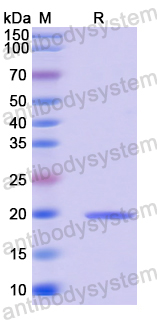Catalog No.
YHK02602
Expression system
E. coli
Species
Homo sapiens (Human)
Protein length
Ser59-Gln132
Predicted molecular weight
20.42 kDa
Nature
Recombinant
Endotoxin level
Please contact with the lab for this information.
Purity
>90% as determined by SDS-PAGE.
Accession
Q8IV16
Applications
ELISA, Immunogen, SDS-PAGE, WB, Bioactivity testing in progress
Form
Lyophilized
Storage buffer
Lyophilized from a solution in PBS pH 7.4, 0.02% NLS, 1mM EDTA, 4% Trehalose, 1% Mannitol.
Reconstitution
Reconstitute in sterile water for a stock solution. A copy of datasheet will be provided with the products, please refer to it for details.
Shipping
In general, proteins are provided as lyophilized powder/frozen liquid. They are shipped out with dry ice/blue ice unless customers require otherwise.
Stability and Storage
Use a manual defrost freezer and avoid repeated freeze thaw cycles. Store at 2 to 8°C for frequent use. Store at -20 to -80°C for twelve months from the date of receipt.
Alternative Names
GPIHBP1, Glycosylphosphatidylinositol-anchored high density lipoprotein-binding protein 1, GPI-anchored HDL-binding protein 1, HBP1, High density lipoprotein-binding protein 1, GPI-HBP1
Reciprocal Fluctuations in Lipoprotein Lipase, Glycosylphosphatidylinositol-Anchored High-Density Lipoprotein-Binding Protein 1, and Hepatic Triglyceride Lipase Levels in the Peripheral Bloodstream Are Correlated with Insulin Resistance., PMID:40507147
KLF13 promotes esophageal cancer progression and regulates triacylglyceride and free fatty acid metabolism through GPIHBP1., PMID:40450000
Single-cell RNAseq of Angiotensin II-induced abdominal aortic tissue identifies aneurysm-associated cell clusters in C57BL/6J mice., PMID:40440080
Unveiling Genetic Markers for Milk Yield in Xinjiang Donkeys: A Genome-Wide Association Study and Kompetitive Allele-Specific PCR-Based Approach., PMID:40243566
Aspirin impedes non-small cell lung cancer development via fine-tuning the CD36 localization regulated by GPIHBP1., PMID:40114952
ANGPTL3/8 is an atypical unfoldase that regulates intravascular lipolysis by catalyzing unfolding of lipoprotein lipase., PMID:40112106
Comprehensive analysis of Chinese patients with non-LPL familial chylomicronemia syndrome: Genetic variants, dietary interventions, and clinical insights., PMID:40023655
Single-cell atlas of human pancreatic islet and acinar endothelial cells in health and diabetes., PMID:39915484
Cascade screening of a Pakistani consanguineous familial hypercholesterolemia cohort: Identification of seven new homozygous patients., PMID:39903948
GPIHBP1 increase accounts for rheumatic arthritis-related hypotriglyceridemia by facilitating lipids uptake of white adipose tissues., PMID:39856718
Competitive displacement of lipoprotein lipase from heparan sulfate is orchestrated by a disordered acidic cluster in GPIHBP1., PMID:39814316
Identification and functional analysis of novel homozygous LMF1 variants in severe hypertriglyceridemia., PMID:39537501
Distinct strategies for intravascular triglyceride metabolism in hearts of mammals and lower vertebrate species., PMID:39435661
Associations of Circulating ANGPTL3, C-Terminal Domain-Containing ANGPTL4, and ANGPTL3/8 and ANGPTL4/8 Complexes with LPL Activity, Diabetes, Inflammation, and Cardiovascular Mortality., PMID:39392008
Genetic variants in triglyceride metabolism genes among individuals with hypertriglyceridemia in Colombia., PMID:39278772
A negatively charged cluster in the disordered acidic domain of GPIHBP1 provides selectivity in the interaction with lipoprotein lipase., PMID:39179764
An epigenome-wide study of selenium status and DNA methylation in the Strong Heart Study., PMID:39154409
Increase in GPIHBP1 expression in advanced stage colorectal cancer indicates poor immune surveillance., PMID:38988918
Etiology and emerging treatments for familial chylomicronemia syndrome., PMID:38866702
Homozygous LPL and GPIHBP1 variants causing familial chylomicronaemia syndrome in Sri Lankan children., PMID:38777740
White adipose tissue, a novel antirheumatic target: Clues from its secretory capability and adipectomy-based therapy., PMID:38644540
Familial chylomicronemia syndrome: case reports of siblings with deletions of the GPIHBP1 gene., PMID:38622573
Quantification of lipoprotein lipase in mouse plasma with a sandwich enzyme-linked immunosorbent assay., PMID:38608546
Significant but partial lipoprotein lipase functional loss caused by a novel occurrence of rare LPL biallelic variants., PMID:38561841
Identification of a Compound Heterozygous LMF1 Variants in a Patient with Severe Hypertriglyceridemia - Case Report and Literature Review., PMID:38462482
Sequence Analysis of Six Candidate Genes in Miniature Schnauzers with Primary Hypertriglyceridemia., PMID:38397183
Understanding Hypertriglyceridemia: Integrating Genetic Insights., PMID:38397180
Molecular genetic testing and measurement of levels of GPIHBP1 autoantibodies in patients with severe hypertriglyceridemia: The importance of identifying the underlying cause of hypertriglyceridemia., PMID:37981531
AAV-mediated hepatic LPL expression ameliorates severe hypertriglyceridemia and acute pancreatitis in Gpihbp1 deficient mice and rats., PMID:37974401
The GPIHBP1-LPL complex and its role in plasma triglyceride metabolism: Insights into chylomicronemia., PMID:37951027
The lipoprotein lipase that is shuttled into capillaries by GPIHBP1 enters the glycocalyx where it mediates lipoprotein processing., PMID:37871217
Hypertriglyceridemia in Apoa5-/- mice results from reduced amounts of lipoprotein lipase in the capillary lumen., PMID:37824203
The East Asian-specific LPL p.Ala288Thr (c.862G > A) missense variant exerts a mild effect on protein function., PMID:37550668
Role of glycosylphosphatidylinositol-anchored high-density lipoprotein binding protein 1 in hypertriglyceridemia and diabetes., PMID:37448184
Marked hypertriglyceridemia with a novel splicing mutation in GPIHBP1., PMID:37350556
Relationship between serum Betatrophin, GPIHBP1, and LDL subfractions in patients with gestational diabetes mellitus., PMID:37277027
Severe hypertriglyceridemia caused by Gpihbp1 deficiency facilitates vascular remodeling through increasing endothelial activation and oxidative stress., PMID:37172802
Inverse association between apolipoprotein C-II and cardiovascular mortality: role of lipoprotein lipase activity modulation., PMID:37155355
Inverse effects of APOC2 and ANGPTL4 on the conformational dynamics of lid-anchoring structures in lipoprotein lipase., PMID:37094117
Analyses of familial chylomicronemia syndrome in Pereira, Colombia 2010-2020: a cross-sectional study., PMID:36978188
Role of lipoprotein lipase activity measurement in the diagnosis of familial chylomicronemia syndrome., PMID:36813655
Intracapillary LPL levels in brown adipose tissue, visualized with an antibody-based approach, are regulated by ANGPTL4 at thermoneutral temperatures., PMID:36787365
Genetic Variants Associated with Severe Hypertriglyceridemia: LPL, APOC2, APOA5, GPIHBP1, LMF1, and APOE., PMID:36689289
Biochemical, Clinical, and Genetic Characteristics of Mexican Patients with Primary Hypertriglyceridemia, Including the First Case of Hyperchylomicronemia Syndrome Due to GPIHBP1 Deficiency., PMID:36613909
A case of hyperchylomicronemia associated with GPIHBP1 autoantibodies and fluctuating thyroid autoimmune disease., PMID:36402671
Familial chylomicronemia syndrome: The first case reported in Ecuador., PMID:36184299
GPIHBP1 autoantibody is an independent risk factor for the recurrence of hypertriglyceridemia-induced acute pancreatitis., PMID:36064883
A homozygous variant in the GPIHBP1 gene in a child with severe hypertriglyceridemia and a systematic literature review., PMID:36051701
A protein of capillary endothelial cells, GPIHBP1, is crucial for plasma triglyceride metabolism., PMID:36037340

